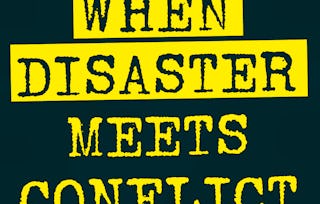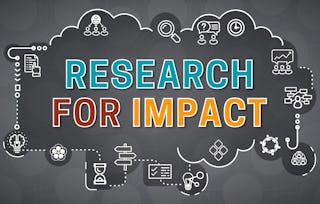Evidence is central to good decision-making both in the humanitarian sector and beyond. Every day, a vast amount of evidence is generated that is relevant to humanitarian actors, much of it through research by academics and practitioners. This evidence can be incredibly valuable. It can help us better understand a situation and make humanitarian action more effective and accountable. The difficulty comes with understanding what evidence is relevant to our circumstances, where to find it, and how to assess its quality.

Operational Research for Humanitarians

Operational Research for Humanitarians



Instructors: Karl Blanchet
11,693 already enrolled
Included with
151 reviews
Recommended experience
Skills you'll gain
Details to know

Add to your LinkedIn profile
32 assignments
See how employees at top companies are mastering in-demand skills

There are 5 modules in this course
In this first module, we will dive right into the question of why there is a need for research in humanitarian settings. We will explore the difficult decision-making processes in humanitarian settings and how a good decision relies on four different types of inputs. The starting point will be the concept of evidence and how it connects to human biases and professional judgement. By hearing from global experts, implementing practitioners and your fellow learners we will critically explore the value of research by asking why, when and for whom?
What's included
10 videos9 readings5 assignments1 app item1 discussion prompt1 plugin
In this second module, we will gain a foundational understanding and skills around research and its processes, methods, and core terminology. We also explore ways of answering the key question of "What evidence is good enough?". This will help us to gain the skills to examine common study designs and identify each of their strengths and weaknesses. With this foundation, we will then - in the next module - explore how the concept of quality becomes a little more blurred when implementing research in humanitarian settings.
What's included
10 videos5 readings5 assignments3 app items1 discussion prompt
In this module, you will gain a solid understanding of how the key characteristics of humanitarian settings are affecting how we can (or cannot) apply the study designs that we covered in module two. We will explore how, to overcome these common challenges, we need to adapt and combine our study designs and tools. At the end of this module, you will be equipped with a slightly different research toolbox, one that is more appropriate to be used in humanitarian settings. Throughout this module's journey, we will be heavily guided by practical examples and existing projects.
What's included
12 videos9 readings9 assignments
The fourth module will delve into one of the most critical aspects of good research practice: Ethics. Having explored the potential benefits of research in humanitarian settings earlier, we will focus here on the potential risks and ethical dilemmas when conducting research. We will start with reviewing some infamous historical examples of unethical research, like the Tuskegee study. Together, we will then establish good practices of how we can systematically and genuinely integrate ethical considerations and risk mitigation into our research projects. As part of that, we will specifically look into community engagement as one of the many powerful tools that we have. This module will also help you understand many of the core research ethics processes, such as informed consent and ethical review boards.
What's included
8 videos7 readings6 assignments2 app items2 discussion prompts
With this final module, we will connect all our insights and learnings by returning to our initial questions on the value of research in humanitarian settings. This time, we will focus on the “how”, by seeing how we can ensure that our research is valuable and how to translate the evidence that we have generated into actionable recommendations. We will explore common pitfalls of sharing evidence and learn about approaches and tools that have proven themselves useful over time. Beyond learning a step-by-step process, we will learn to appreciate the importance of contextual approaches that take existing power dynamics into account.
What's included
11 videos7 readings7 assignments2 app items
Instructors


Offered by
Explore more from Research
 Status: Free
Status: FreeErasmus University Rotterdam
 Status: Preview
Status: PreviewUniversity of Cape Town
 Status: Free
Status: FreeJohns Hopkins University
 Status: Preview
Status: PreviewEmory University
Why people choose Coursera for their career

Felipe M.

Jennifer J.

Larry W.

Chaitanya A.
Learner reviews
- 5 stars
82.11%
- 4 stars
15.89%
- 3 stars
0.66%
- 2 stars
0.66%
- 1 star
0.66%
Showing 3 of 151
Reviewed on May 15, 2025
Very knowledgable, practical and interactive research course for feeding the mind with more interests and inquiry into research and it's application.
Reviewed on Feb 18, 2023
The contents, pacing and insights of the presenters in the MOOC were all great. Useful information. Recommend taking this course, if only to rephrase your existing knowledge in more formal terms.
Reviewed on Mar 24, 2023
An amazing course. Detailed and insightful yet practical.

Open new doors with Coursera Plus
Unlimited access to 10,000+ world-class courses, hands-on projects, and job-ready certificate programs - all included in your subscription
Advance your career with an online degree
Earn a degree from world-class universities - 100% online
Join over 3,400 global companies that choose Coursera for Business
Upskill your employees to excel in the digital economy
Frequently asked questions
To access the course materials, assignments and to earn a Certificate, you will need to purchase the Certificate experience when you enroll in a course. You can try a Free Trial instead, or apply for Financial Aid. The course may offer 'Full Course, No Certificate' instead. This option lets you see all course materials, submit required assessments, and get a final grade. This also means that you will not be able to purchase a Certificate experience.
When you purchase a Certificate you get access to all course materials, including graded assignments. Upon completing the course, your electronic Certificate will be added to your Accomplishments page - from there, you can print your Certificate or add it to your LinkedIn profile.
Yes. In select learning programs, you can apply for financial aid or a scholarship if you can’t afford the enrollment fee. If fin aid or scholarship is available for your learning program selection, you’ll find a link to apply on the description page.
More questions
Financial aid available,





